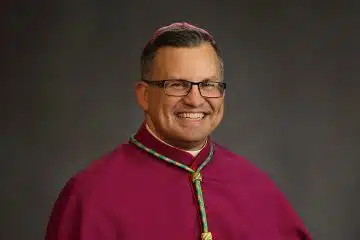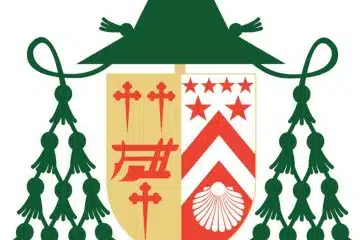God’s great love for the faithful
March 16, 2012
By Father Timothy P. Schehr
Fourth Sunday of Lent: 2 Chronicles 36:14-23; Ephesians 2:4-10; John 3:14-21
Only once every three years do we hear from Chronicles on a Sunday. But the wait is certainly worthwhile. This first reading provides the perfect summary of God’s ways with the people.
The Chronicler tells us God sent messengers to Judah “early and often.” This phrase puts the accent on how much attention God gave to the spiritual well-being of the people. God did not wait for something bad to happen to them. Instead God consistently took the initiative to send spiritual guides to keep the people on the path of life. God gave them every opportunity to make the right choices. And if they failed at that they, still had plenty more opportunities to change their ways and get back on track with God.
What kind of response did God get for all this effort towards salvation? The central verses of the reading tell the story. The people mocked God’s messengers, scoffing at their words and their message. With God’s ways so little a part of their lives, the kingdom grew weaker and weaker until it eventually collapsed altogether. The Chronicler sadly records the destruction of the temple and the exile of the people. They refused to serve the Lord God. Now they serve the royal family of Babylon who would never care to look after their needs “early and often” as God had done.
Babylon certainly was a power to be reckoned with. But that great empire was no match for God. The reading ends with the prospect of a brighter future for the people. The wise king Cyrus is already making plans to restore the city and its temple. God is once again taking the initiative for good.
This theme of God’s initiative for good is expressed perhaps most memorably by John 3:16 in the Gospel reading for this Sunday. God’s love for the world is so great that God gives His only Son to bring those who believe in him to eternal life. As the reading begins, Jesus is speaking to Nicodemus about the serpent in the desert. God told Moses to lift that serpent up so the people could see it and be healed. In the same way, Jesus will be lifted up to heal humanity from sin and death.
Nicodemus was coming to Jesus under cover of darkness because he feared the opinion of his associates in the Jewish high council. By the end of the gospel Nicodemus will be standing in the light as he assists Joseph of Arimathea in honoring the body of Jesus. In this reading Jesus draws an important lesson based on the difference between light and darkness. Jesus is the light of the world, showing the way to eternal life. He wants God children to step out of the darkness and into the light. Why prefer darkness and hate light? Such a choice belongs only to people who are not proud of the things they do. Jesus invites people to let go of the illusions of grandeur offered by the world and embrace instead the truth that we are God’s children crated for much more than this limited world can offer.
Paul echoes this theme in his Letter to Ephesus. He reminds the faithful of the great love God has for them, so great that God sent us Jesus even when “we were dead in our transgressions.” We are God’s handiwork. We are created in Christ for the good works we are now empowered to perform through God’s grace. The Chronicler would be so thrilled to have heard this. God’s efforts “early and often” were finally getting some response.
Father Schehr is a faculty member at the Athenaeum of Ohio.













